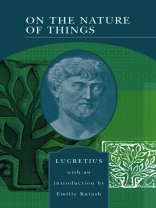Lucretius dazzling poetic work,
On the Nature of Things, composed during the late Roman Republic, has captivated imaginations for twenty-one centuries. This epic promises to lift the reader above common fears, ambitions, and misery; as well as the terror of living in a universe controlled by little-understood forces. Lucretius uses the framework of Epicurus teachings to create an ethics based on free will, the value of friendship, and the serenity of intellectual reflection.
It was Lucretius hope that
On the Nature of Things would provide an antidote to the politically insecure environment of the late Republic, and perhaps for all time to come. We can read this magnificent poem to learn how to view the world without illusions and contemplate the workings of nature with a clear, untroubled mind.
Sobre o autor
Titus Lucretius Carus was born anywhere from 99 to 94 BC and was admired by Virgil and discussed by Cicero. Lucretius is one of the chief promoters of Epicurean philosophy to come out of antiquity, and
On the Nature of Things made Epicurus known to subsequent generations.












